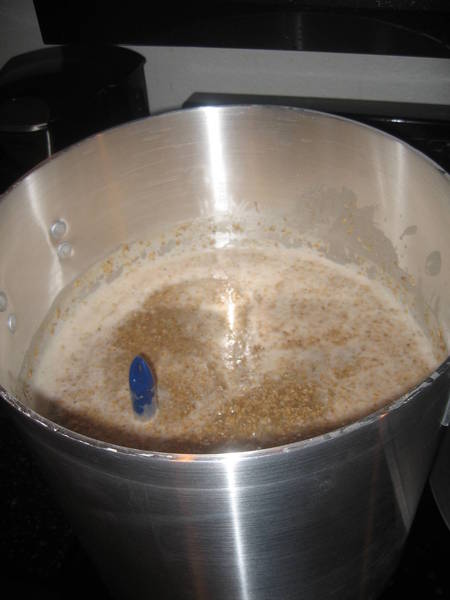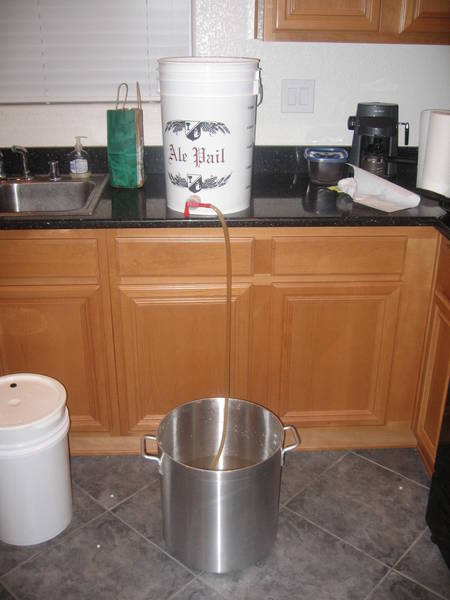peachwein
Well-Known Member
Thanks for the thread.. I'd love to try this

I am curious how long you are waiting to see if your water will boil?
I did 4 gallons of water on my stove the other day just as an experiment... at half an hour the pot was still cool to the touch. At 50 mins it had reached strike water temps, at 1hour it was boiling. It wasn't super fast, but it did get there.
Granted your stove may not do it... but mine is old and cheap, so I would be surprised if it is better than average.
I would use your burner. I do this method all the time with one burner. You should never heat the pot when there are grains in it, anyway.
1. Heat mash water...mash in. Set mash pot aside and cover with blankets to keep warm. Do not set on concrete...it'll suck the heat right out of it.
2. Heat sparge water while you are mashing.
3. Sparge.
4. Mix pots together.
5. Heat and boil.
As for corrections...if you use the proper calculations, you shouldn't need any corrections. Use the green bay rackers site for good calculators.



DeathBrewer, one more final question if you don't mind. Which of the below bags would you recommend for steeping the grains in with your stovetop method?
Thanks again!
Extra Fine Nylon Bag (Drawstring)
Extra Large Muslin Bag
Jumbo Coarse Nylon Bag
Large Coarse Nylon Bag
Large Muslin Bag
I am looking at this page: http://www.austinhomebrew.com/index.php?cPath=178_33_403
This was a 5 gallon batch, but if you start your boil with 5 gallons at the beginning of your boil, you will need to top off at the end.
Instead of pouring some of my sprage water over the graints iinto the wort, should I just have more water in my strike pot to start. Instead of using 3 shold I bump it up to 3.75. That way I will only need 2.25 gal in the sprage pot. Am I thinking correctly here?
Instead of pouring some of my sprage water over the graints iinto the wort, should I just have more water in my strike pot to start. Instead of using 3 shold I bump it up to 3.75. That way I will only need 2.25 gal in the sprage pot. Am I thinking correctly here?
Yes and No. What you are thinking can be done, and you are correct in needing less in the sparge, but the amount of water you mash in with is very important to how the beer will come out (More so than temp, if I am not mistaken). Some beer styles require less or more strike water. The sparge doesn't really matter, as with this method it is just to make up volume, so that can vary as you need it. However, strike amount is very important to the fermentability of the beer.
Google 'Mash Thickness', and you should come across plenty of info.
Deathbrewer, your all grain stovetop method is a great post that gives people with limited space hope.
I have a question, what do you think about the idea of using 2 stove burners and "Splitting" their grain mashing into 2 pots. so 1/2 done on 1 burner and the other 1/2 done on the other. It would take 2 grain bags, but would be more effective IMO for people limited in space. Also, it is really easy to find 2 x 5 gallon stainless Stock pots.
Also it is easier/faster to boil 2 gallons of water than it is to boil higher amouts on your stove top, Especially in stainless pots.
The ratio wouldn't be too out of range for what he's trying, but it's just not a big enough pot. I mash anywhere from 1.25qt-1.60qt per pound...throughout that range will work fine, although it may change the beer profile slightly.
I would say temp is more important AS LONG AS you stay within that range.
pH is always a concern and something I have never addressed in these threads....I should really add it. Checking your mash pH and correcting it will definitely help ensure a tasty, to-style beer. High temps are indeed the concern and I would never advise mashing out at more than 165°F...I've had a few bad batches when I was hitting my 168°F mash-out temp and was not correcting my pH...it caused some astringency.
I think the only argument is what is defined as "thick" or "thin"...many people will tell you that anywhere from 1.0-2.0qt/lb is fine, but is there really a huge difference between 1.25 & 1.60qt/lb? I used to use whatever ratio was convenient for the amount of water I wanted to use, but these days I'm trying to always hit close to 1.50qt/lb.
I think the 1 TBSP they recommend is probably overkill
I think the 5.2 works pretty well, but I've been liking the idea of adjusting with more traditional methods, using lactic acid and/or acid malt.
Enter your email address to join: